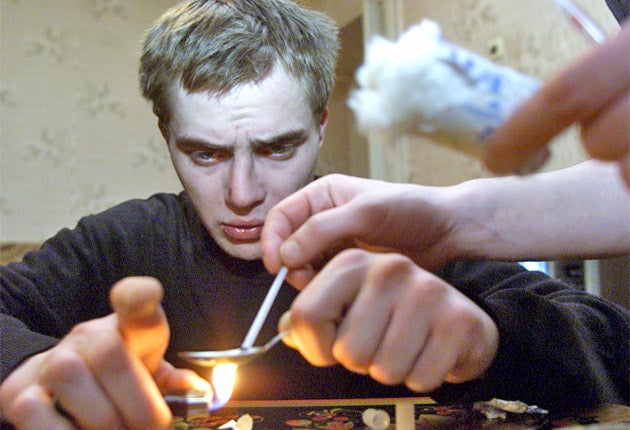'Harm reduction' for heroin users has few fans in Russian heirarchy

Dressed in a black padded jacket and navigating his way through a green apple with his few remaining teeth, Sanya is already waiting when Maxim Malyshev arrives at the usual place.
Once a week, Mr Malyshev holds court outside a small chemist in the Moscow suburb of Marino, under steely grey skies and with a backdrop of drab 20-storey apartment blocks on all sides.
Sanya and several other heroin addicts who drop by all receive a plastic bag full of various provisions: needles, syringes, creams and medicines, and condoms for those who want them. For Sanya, bandages and disinfectant will be especially useful – he has a wound on his leg that means he can hardly walk.
"I went to the local clinic but they told me to f*** off again," he says, forlornly.
Mr Malyshev works for the Andrei Rylkov Foundation, the only organisation that works on "harm reduction" among heroin users in Moscow. Russia has one of the world's worst heroin epidemics, but basic measures used in other countries to reduce health risks among addicts are controversial here. The work that the Andrei Rylkov Foundation does, distributing clean injecting equipment, is unusual in Russia and has come under attack from the authorities, even though similar programmes are in force across the world, including in authoritarian states such as China.
The importance of clean needles is emphasised by Russia's HIV epidemic, the fastest growing in the world. Around one million people are believed to be HIV-positive and the majority of them contracted the virus through drug use.
Russia is on the transit route for heroin from Afghanistan and could have up to three million heroin users, according to NGOs. When heroin is not readily available, people switch to injecting pharmacy drugs such as krokodil, which is brewed up from codeine painkillers, petrol, pipe cleaner and iodine. It rots the flesh of those who inject it.
"Without us, they don't have the money to buy clean needles and syringes," says Mr Malyshev.
Damon Barrett, deputy director of Harm Reduction International, an advocacy association in London, says that every relevant UN agency and most countries globally have admitted that harm reduction works.
Not Russia, though. Officials have made clear what they think of the philosophy of harm reduction on a number of occasions.
"We tried this," said Yevgeny Bryun, an official from the ministry of health. "Strangely enough, we saw a spike in drug use and HIV cases."
Advocates of harm reduction say that such a growth in official statistics is natural, as when their programmes work well, it brings drug users in from the margins and gets them registered for healthcare and other services.
"Russia is the world's cautionary tale on drugs and HIV," says Mr Barrett.
Join our commenting forum
Join thought-provoking conversations, follow other Independent readers and see their replies
Comments
Bookmark popover
Removed from bookmarks